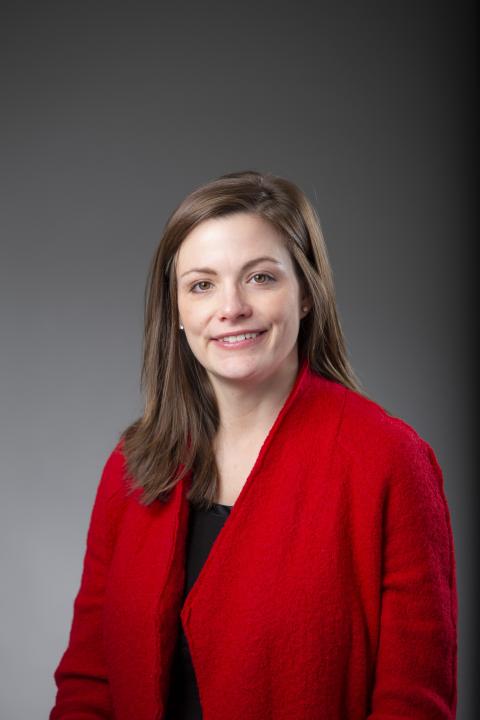On the COVID-19 Front Lines: Courtney Tanner JD'14/MSW'15
Prior to the arrival of COVID-19 in the United States and New Hampshire, Courtney Tanner JD’14, MSW’15 spent significant time in the halls of the NH State House and the Legislative Office Building in Concord. In the most recent legislative session, she was advocating for bills that support an expansion of telehealth services in the state. As it turns out, the timing was perfect.

Tanner works in the Government Relations Office at Dartmouth-Hitchcock, a healthcare system comprised of an academic medical center in Lebanon and community group practices in the southern part of New Hampshire. Since the COVID-19 crisis began, the three-member Government Relations team has spent much of its time monitoring federal and state waivers and guidance to allow for flexibility in healthcare delivery, including telehealth services. Her team also has been working closely with the NH Office of Professional Licensure and the NH Department of Health and Human Services to relax some of the statues and administrative rules governing the healthcare profession. For example, Tanner has worked on requests for rule waivers to minimize the number of providers needed in a room during a patient visit.
“These waiver requests,” she says, “whether statutory or through administrative rules, help ensure healthcare personnel have limited risk of transmission, help to conserve the limited personal protective equipment, and assist in preparing the healthcare system for a surge of COVID patients.”
In the months leading up to the pandemic, Tanner was supporting a bill that would allow telehealth for Medication-Assisted Treatment (MAT), meaning patients suffering from substance use disorders could request prescriptions from providers even if their relationship with those providers had not yet included a face-to-face visit. The impetus behind the bill was to allow hospitals to provide MAT for patients who present at the emergency room without a prior connection to a care team doctor who has authorization to prescribe without a waiver.
“The bill we were working on was very narrow, only for MAT for substance use disorders,” Tanner explains. “Since COVID, it has been interesting to see how to ensure we can provide care during the crisis. Much of our work has been making sure the federal agencies are either waiving or issuing guidance that parallels state waivers and guidance.”
The recent change in professional pace and focus came overnight, says Tanner, who has been working from her home in Bedford for the last several weeks while caring for her infant daughter, Joanna. On March 13, she was meeting with stakeholders about a bill. By the following Monday, March 16, the state legislature had suspended its session indefinitely. She describes the change in her job functions as “more immediate.”
“It’s now all COVID, all the time, and we don’t know exactly what will happen with the legislature,” she says, noting that the telehealth focus has shifted from delivering services not just for special populations in the state but for everyone requiring care. “On a human level, COVID-19 has brought everybody to the table. You can hear kids and dogs on calls; we are bringing our entire selves with us to work. It has been nice to be authentic – everyone is rolling up their sleeves to make sure we take care of New Hampshire.”
A Granite State transplant, Tanner grew up in Kennebunk, Maine, and graduated from Saint Anselm College in 2011. As an undergraduate, she completed an internship through the NH Bar Association with the Dove Project, a program that helps pair volunteer attorneys with low-income women in abusive relationships. Tanner grew to appreciate the small legal community in the state and decided to remain in New Hampshire for law school. At UNH, she enrolled in a dual program that allowed her to earn both her JD and her MSW. Her plan at the time was to use her degrees to represent women who were victims of domestic violence or help children in difficult situations.
“While I was in school for social work, I discovered I liked public policy,” she says. “You have to follow your heart. Some people find happiness in the courtroom, others at the State House.”
Prior to joining the Government Relations Office at Dartmouth-Hitchcock in late 2018, Tanner ran Hope on Haven Hill, a residential facility that treats pregnant and parenting women for substance abuse disorders, providing direct service versus systemic policy work. She gained previous experience as executive director of the NH Providers Association, an organization dedicated to substance use prevention, treatment, and recovery through public policy.
“Pursuing a JD/MSW at UNH gave me a foundation in both the clinical and policy spheres,” Tanner says. “Working in the Office of Government Relations at Dartmouth-Hitchcock, I carry the foundation of both spheres to advocate for our patients, providers, and the health system.”
While it has proven challenging at times to connect via teleconference and phone calls with colleagues with whom she typically interacts in person, Tanner sees a positive angle to the current situation. Until recently, legislative work for telehealth services was ancillary, but Tanner believes that will no longer be the case once the pandemic subsides.
“This will show us we can do [telehealth] and do it well,” Tanner says. “The crisis is also exposing some vulnerable populations that don’t have access to technology, bringing to light those who are marginalized and how we support them going forward. I hope this crisis sparks more conversations about telehealth and innovative delivery of healthcare for the future.”